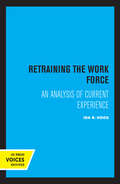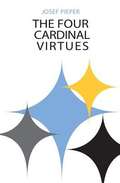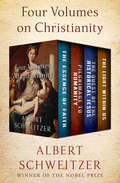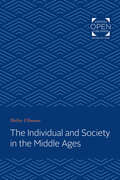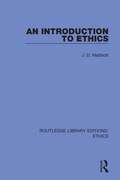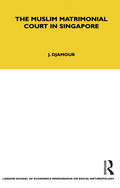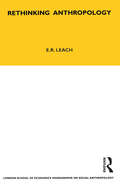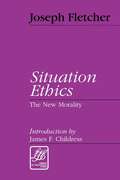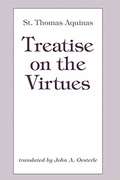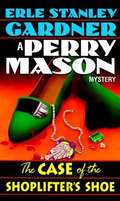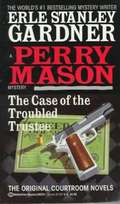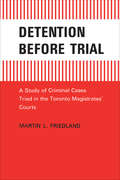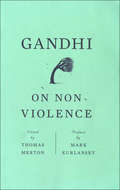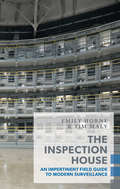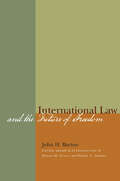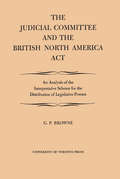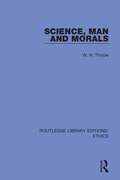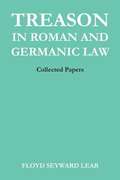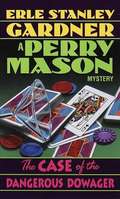- Table View
- List View
Retraining the Work Force: An Analysis of Current Experience
by Ida R. HoosThis title is part of UC Press's Voices Revived program, which commemorates University of California Press’s mission to seek out and cultivate the brightest minds and give them voice, reach, and impact. Drawing on a backlist dating to 1893, Voices Revived makes high-quality, peer-reviewed scholarship accessible once again using print-on-demand technology. This title was originally published in 1967.
The Case of the Worried Waitress
by Erle Stanley GardnerA pretty waitress is accused of stealing $100 from her wealthy aunt's hatbox and a blind pencil-seller earns enough to come to work in a taxicab. It is a mystery for Perry Mason and it will take some quick thinking and careful planning on his part to find the culprits.
Custom and Conflict in Africa
by Max GluckmanA distinguished British anthropologist, Max Gluckman (1911-1975) pioneered the study of traditional African legal systems. His research stressed social conflict and mechanisms for conflict resolution while studying urbanization and social change in colonial Africa.
The Four Cardinal Virtues: Prudence, Justice, Fortitude, Temperance
by Josef PieperIn The Four Cardinal Virtues, Josef Pieper delivers a stimulating quartet of essays on the four cardinal virtues. He demonstrates the unsound overvaluation of moderation that has made contemporary morality a hollow convention and points out the true significance of the Christian virtues.
Four Volumes on Christianity: The Essence of Faith, Pilgrimage to Humanity, The Quest of the Historical Jesus, and The Light Within Us
by Albert SchweitzerFour of the Nobel Peace Prize–winning author&’s most influential, insightful, and inspiring works on theology and ethics in the modern world. Famous for founding the Albert Schweitzer Hospital in what is now the West African country of Gabon, Albert Schweitzer&’s ethical philosophy of &“Reverence for Life&” became one of the most influential ideas of the twentieth century. These four volumes chart the development of Schweitzer&’s philosophy from his student days to his career as a globally revered intellectual. The Essence of Faith: While studying for his PhD at the Sorbonne, Schweitzer developed his views on theology through an analysis of Immanuel Kant&’s philosophy of religion. In The Essence of Faith, Schweitzer explores Kantian ideas to arrive at an inspiring meditation on God, faith, and the limits of human understanding. Pilgrimage to Humanity: In Pilgrimage to Humanity, Schweitzer discusses his philosophy, his ministry in Africa, and his pursuit of world peace. He also explores the important contributions to civilization made by figures such as Johann Wolfgang von Goethe, J. S. Bach, and Jesus of Nazareth. The Quest of the Historical Jesus: In this landmark work of Biblical criticism, Schweitzer deconstructs the traditional myths of Jesus&’s life by offering rigorous textual analysis and historical evidence. By establishing the social and political climate of Jesus&’s time, Schweitzer not only dismantles the previously dominant images of Jesus, but also presents a compelling new theory of his own. The Light Within Us: In The Light Within Us, Schweitzer&’s longtime friend Richard Kik has compiled many of his most insightful and inspiring quotations. Drawn from his many writings, these quotations share Schweitzer&’s thoughts on service, gratitude, God, missionary work, and much more.
The Individual and Society in the Middle Ages
by Walter UllmannOriginally published in 1966. The Individual and Society in the Middle Ages, based on three guest lectures given at Johns Hopkins University in 1965, explores the place of the individual in medieval European society. Looking at legal sources and political ideology of the era, Ullmann concludes that, for most of the Middle Ages, the individual was defined as a subject rather than a citizen, but the modern concept of citizenship gradually supplanted the subject model from the late Middle Ages onward. Ullmann lays out the theological basis of the political theory that cast the medieval individual as an inferior, abstract subject. The individual citizen who emerged during the late Middle Ages and the Renaissance, by contrast, was an autonomous participant in affairs of state. Several intellectual trends made this humanistic conception of the individual possible, among them the rehabilitation of vernacular writing during the thirteenth century and the growing interest in nature, natural philosophy, and natural law. However, Ullmann points to feudalism as the single most important medieval institution that laid the groundwork for the emergence of the modern citizen.
An Introduction to Ethics
by J. D. MabbottOriginally published in 1966, this introduction to moral philosophy examines the philosophical basis of moral problems and considers some of the crucial arguments that attempt to define or dispense with a moral justification of events. Some of the questions discussed are whether moral rules are justified and whether there is any positive evidence that man has free will.
The Muslim Matrimonial Court in Singapore (LSE Monographs on Social Anthropology #Vol. 31)
by Judith DjamourThis book is an anthropologist's field study of the new court set up in Singapore to deal with matrimonial suits (chiefly divorce) among Muslims. The study is based on careful observation of the court in action, and analyses in detail the relationship between the reformist aims of the new law and the values and expectations of litigants. The book takes its departure from the argument developed in Dr Djamour's earlier work, Malay Kinship and Mamage in Singapore (Athlone Press, 1959; paperback edition 1965), and discusses the effect of recent attempts to promote the stability of Muslim marriage. Social scientists, lawyers, students of Islam, and those interested in Malayan problems will find in this book the same qualities that distinguished Dr Djamour's previous study -- lively and sympathetic descriptive powers joined to an ability for clear factual analysis.
Rethinking Anthropology: Volume 22 (LSE Monographs on Social Anthropology #22)
by E. R. LeachA collection of brilliant and provocative essays from Edmund Leach, one of the most original voices in the social anthropological tradition.
Situation Ethics: The New Morality (Library of Theological Ethics)
by Joseph FletcherIgniting a firestorm of controversy upon its publication in 1966, Joseph Fletcher's Situation Ethics was hailed by many as a much-needed reformation of morality--and as an invitation to anarchy by others. Proposing an ethic of loving concern, Fletcher suggests that certain acts--such as lying, premarital sex, adultery, or even murder--might be morally right, depending on the circumstances. Hotly debated on television, in magazines and newspapers, in churches, and in the classroom, Fletcher's provocative thesis remains a powerful force in contemporary discussions of morality. <p><p> The Library of Theological Ethics series focuses on what it means to think theologically and ethically. It presents a selection of important and otherwise unavailable texts in easily accessible form. Volumes in this series will enable sustained dialogue with predecessors though reflection on classic works in the field.
Treatise on the Virtues
by John A. Oesterle Thomas AquinasIn his Treatise on the Virtues, Aquinas discusses the character and function of habit; the essence, subject, cause, and meaning of virtue; and the separate intellectual, moral, cardinal, and theological virtues. His work constitutes one of the most thorough and incisive accounts of virtue in the history of Christian philosophy. John Oesterle's accurate and elegant translation makes this enduring work readily accessible to the modern reader.
The Case of the Beautiful Beggar
by Erle Stanley GardnerA beautiful debutante is shocked. Her beloved wealthy uncle is missing. Strange relatives are in charge of his fortune- and they're counting her out. Then a dead man surfaces, pointing his finger straight at her. Now she's desperate. To Perry Mason, however, it's all in a day's work. With clever secretary Della Street and street wise detective Paul Drake, he takes on THE CASE OF THE BEAUTIFUL BEGGAR.
The Case of the Shoplifter's Shoe
by Erle Stanley GardnerAfter her well-to-do Aunt Sarah is caught shoplifting, Virginia Trent is convinced she needs to seek psychiatric help for kleptomania. So why does Virginia turn to legal eagle Perry Mason? Because a cache of valuable diamonds--left in Sarah's care--has suddenly vanished into thin air. Virginia thinks Sarah swiped the stones, but gem dealer Austin Cullens begs to differ. In fact, he's prepared to forgive and forget--until he is mysteriously murdered and Sarah is caught running from the crime scene. Now it appears the lady with the sticky fingers may have blood on her hands. ...
The Case of the Troubled Trustee
by Erle Stanley GardnerPerry Mason acquires an interesting client, who was made trustee for the girl he loved and embezzled her funds for her own protection.
Detention Before Trial: A Study of Criminal Cases Tried in the Toronto Magistrates' Courts
by Martin L. FriedlandDetention before trial has been one of the most neglected areas in the whole administration of criminal justice. In the past, attention has been focussed almost exclusively on detention after trial (i.e. sentencing), which touches the lives of significantly fewer persons than detention before trial. There has been no previous examination in Canada of the utility or effectiveness of its operation. This study will fill an important need by documenting statistically the extent and nature of custody before trial in the Toronto Magistrates' Courts, where the overwhelming majority of citizens charged with criminal offences in the Toronto area are tried. Although the study is primarily directed at practices before trial in Toronto, many of these practices can be found in other cities throughout North America. Specific areas of importance which were investigated here include the use of the summons; the extent to which accused persons are detained in custody both before and after the first court appearance; bail-setting practices and the ability to raise bail; the activities of professional bondsmen; the enforcement of penalties for absconding; and the relationship between custody and the outcome of the trial. Much of the presentation of the data is descriptive, but attempts are made throughout the study to prove statistically the existence of casual relationships. The result is a work which brings together in lucid and scholarly form important evidence which will be valuable to lawyers and all who are professionally concerned with social problems, and of interest to everyone with a regard for the administration of justice.
Gandhi on Non-Violence
by Mark Kurlansky Mahatma Gandhi Thomas MertonAn essential compendium for understanding Gandhi's profound legacy. "One has to speak out and stand up for one's convictions. Inaction at a time of conflagration is inexcusable."--Mahatma Gandhi The basic principles of Gandhi's philosophy of non-violence (Ahimsa) and non-violent action (Satyagraha) were chosen by Thomas Merton for this volume in 1965. In his challenging Introduction, "Gandhi and the One-Eyed Giant," Merton emphasizes the importance of action rather than mere pacifism as a central component of non-violence, and illustrates how the foundations of Gandhi's universal truths are linked to traditional Hindu Dharma, the Greek philosophers, and the teachings of Christ and Thomas Aquinas. Educated as a Westerner in South Africa, it was Gandhi's desire to set aside the caste system as well as his political struggles in India which led him to discover the dynamic power of non-cooperation. But, non-violence for Gandhi "was not simply a political tactic," as Merton observes: "the spirit of non-violence sprang from an inner realization of spiritual unity in himself." Gandhi's politics of spiritual integrity have influenced generations of people around the world, as well as civil rights leaders from Martin Luther King, Jr. and Steve Biko to Václav Havel and Aung San Suu Kyi. Mark Kurlansky has written an insightful preface for this edition that touches upon the history of non-violence and reflects the core of Gandhi's spiritual and ethical doctrine in the context of current global conflicts.
The Inspection House: An Impertinent Field Guide to Modern Surveillance (Exploded Views)
by Emily Horne Tim MalyIn 1787, British philosopher and social reformer Jeremy Bentham conceived of the panopticon, a ring of cells observed by a central watchtower, as a labor-saving device for those in authority. While Bentham's design was ostensibly for a prison, he believed that any number of places that require supervision--factories, poorhouses, hospitals, and schools--would benefit from such a design. The French philosopher Michel Foucault took Bentham at his word. In his groundbreaking 1975 study, Discipline and Punish, the panopticon became a metaphor to describe the creeping effects of personalized surveillance as a means for ever-finer mechanisms of control. Forty years later, the available tools of scrutiny, supervision, and discipline are far more capable and insidious than Foucault dreamed, and yet less effective than Bentham hoped. Shopping malls, container ports, terrorist holding cells, and social networks all bristle with cameras, sensors, and trackers. But, crucially, they are also rife with resistance and prime opportunities for revolution. The Inspection House is a tour through several of these sites--from Guantánamo Bay to the Occupy Oakland camp and the authors' own mobile devices--providing a stark, vivid portrait of our contemporary surveillance state and its opponents.
International Law and the Future of Freedom
by Henry T. Greely edited by Helen M. Stacy John H. BartonInternational Law and The Future of Freedom is the late John Barton's exploration into ways to protect our freedoms in the new global international order. This book forges a unique approach to the problem of democracy deficit in the international legal system as a whole—looking at how international law concretely affects actual governance. The book draws from the author's unparalleled mastery of international trade, technology, and financial law, as well as from a wide array of other legal issues, from espionage law, to international criminal law, to human rights law. The book defines the new and changing needs to assert our freedoms and the appropriate international scopes of our freedoms in the context of the three central issues that our global system must resolve: the balance between security and freedom, the balance between economic equity and opportunity, and the balance between community and religious freedom. Barton explores the institutional ways in which those rights can be protected, using a globalized version of the traditional balance of powers division into the global executive, the global legislature, and the global judiciary.
Judicial Committee and the British North America Act, The
by G P. BrowneThis comprehensive study is concerned primarily with the fundamental problem of the role of the judiciary in the federal system of Canadian government. The author criticizes previous accounts of the Judicial Committee's interpretative scheme for the British North American Act because of their neglect of underlying jurisprudential assumptions and their readiness to accept the textual criticisms levelled in the O'Connor Report of 1939; they fail to note the relationship between the jurisprudential and the textual aspects. Professor Browne is convinced that O'Connor's criticism is as ill founded as the alternative interpretive scheme he proposed, and that the "three-compartment" view represents the most convincing construction of sections 91 and 92 of the Act. He considers debatable the "organic statute" argument widely accepted in the United States and becoming more and more popular in Canada; and supports the premium which English courts have traditionally placed on certainty and stability in the law.Professor Browne concludes that the almost universal criticism in Canada of the Judicial Committee's construction of the BNA Act is basically misconceived: Canadian jurists should think carefully before following trends set by American courts, for American purposes, in the context of American law, particularly when the repercussions of those trends are not as yet fully appreciated.This discussion will be of special interest for legal, political, and historical studies in this country, the United States, and other Commonwealth countries, especially those which have federal systems and consequently share the same basic problems of the judiciary in such a system.
Science, Man and Morals
by W. H. ThorpeOriginally published in 1965 and written by one of the world’s leading experts in animal behaviour, this book was written just as the impact of DNA on biology, genetics ethology and biophysics was being felt. The book reviews these developments and analyses the affect they have on our view of our own nature and of ethical and moral sense. It is particularly concerned with the impact of DNA and genetics on philosophic thought.
Treason in Roman and Germanic Law: Collected Papers
by Floyd Seyward Lear"Treason" is a word with many connotations, a word applied to a host of varied offenses throughout the history of mankind. These essays by Floyd Seyward Lear analyze the development of the political theory of treason from its beginning in Roman Law to its transformation in the Germanic custom of the early Middle Ages. The author has presented treason as a political idea, possessing historical continuity, though varying from age to age as it follows the evolution of political authority itself. These studies trace the shifting emphasis in crimes against the state from acts directed against a central absolutist authority to acts involving the personal relationship of a pledged troth and individual fealty. This is a shift from the concept of majesty in Roman law to the concept of fidelity in Germanic law with the corollary shift from allegiance as an act of deference to allegiance as a token of mutual fidelity. These ideas are examined chronologically across an interval extending from archaic Roman law to incipiently feudal forms, from which modern theories of treason, allegiance, and sovereignty derive. Contemporary concepts in these political areas can hardly be understood apart from their historical origins. Broadly considered, this work is intended as a contribution to intellectual history. Further, this collection represents the synthesis of material widely scattered in the primary sources and relevant secondary works. The two concluding bibliographical essays are intended as a general survey of the literature relevant to these studies in Roman and Germanic public law. Descriptive and interpretive works which deal with treason and its allied aspects of political and legal theory are not numerous in the English language.
Ancient Greece
by Robert PayneA history of Greece from its founding to the advent of Philip of Macedon. Covers all aspects of Greek life, philosophy and literature.
The Case of the Dangerous Dowager
by Erle Stanley GardnerWhen Matilda Benson solicits the help of Perry Mason, her request seems simple enough: cruise to a gambling ship moored just beyond the twelve-mile limit and buy back the IOU's signed by Miss Benson's niece. But after Mason reaches the floating casino, he discovers problems aplenty--most notably the ship's owner with a bullet hole through his head. Strangely enough, Matilda and her niece are also on board that night...when someone tosses a gun over the railing. Does Perry Mason's client have something to hide? With the support of his trusty secretary, Della Street, and the ever-helpful Paul Drake, Mason dives into an ocean of menace.
The Case of the Daring Divorcee
by Erle Stanley GardnerWhen a man is shot, his second and third wives each claim to be his legal widow and heir to his millions. Perry Mason triumphs in another dramatic court appearance.
